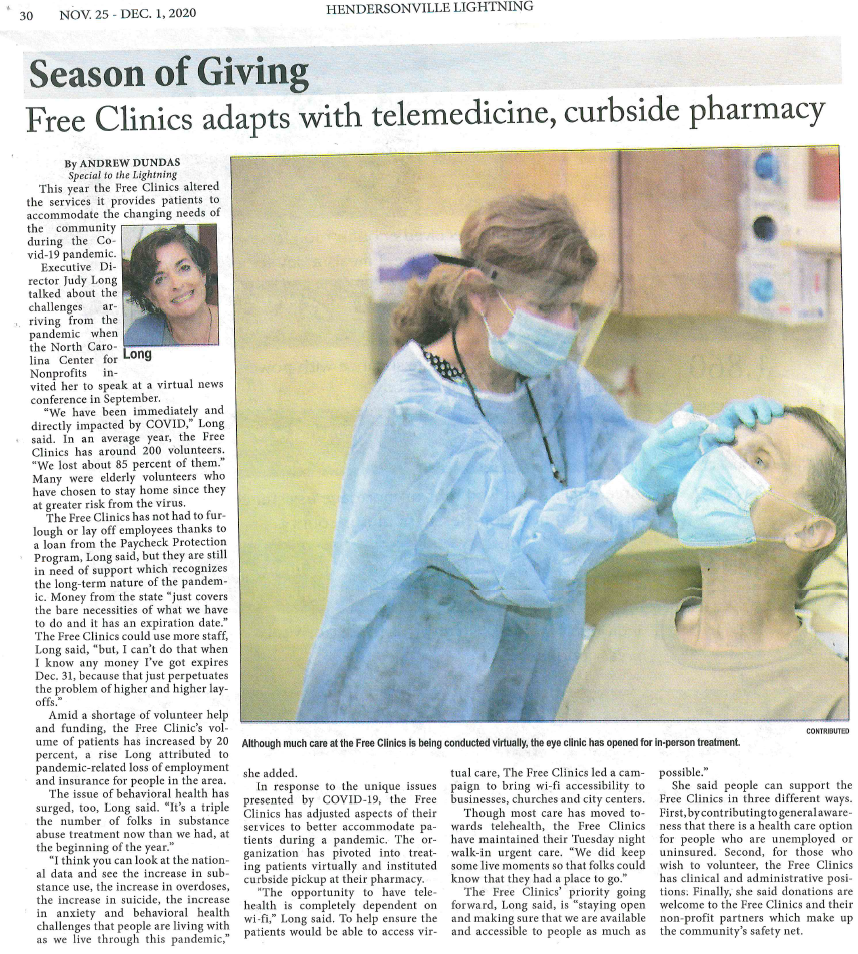Free Clinics adapts with telemedicine, curbside pharmacy

By Andrew Dundas for the Hendersonville Lightning
This year The Free Clinics (TFC) altered the services it provides patients to accommodate the changing needs of the community during the COVID-19 pandemic.
Executive Director Judy Long talked about the challenges arriving from the pandemic when the North Carolina Center for Nonprofits invited her to speak at a virtual news conference in September.
“We have been immediately and directly impacted by COVID,” Long said. In an average year, TFC has around 200 volunteers. “We lost about 85 percent of them.” Many were elderly volunteers who have chosen to stay home since they are at greater risk from the virus.
TFC has not had to furlough or lay off employees thanks to a loan from the Paycheck Protection Program, Long said, but they are still in need of support which recognizes the long-term nature of the pandemic. Money from the state “just covers the bare necessities of what we have to do, and it has an expiration date.” TFC could use more staff, Long said, “but, I can’t do that when I know any money I’ve got expires Dec. 31 because that just perpetuates the problem of higher and higher lay-offs.”
Amid a shortage of volunteer help and funding, TFC’s volume of patients has increased by 20 percent, a rise Long attributed to pandemic-related loss of employment and insurance for people in the area.
The issue of behavioral health has surged, too, Long said “It’s triple the number of folks in substance abuse treatment now than we had at the beginning of the year.
“I think you can look at the national data and see the increase in substance use, the increase in overdoses, the increase in suicide, the increase in anxiety and behavioral health challenges that people are living with as we live through this pandemic,” she added.
In response to the unique issues presented by COVID-19, TFC has adjusted aspects of their services to better accommodate patients during a pandemic. The organization has pivoted into treating patients virtually and instituted curbside pickup at their pharmacy.
“The opportunity to have telehealth is completely dependent on wi-fi,” Long said. To help ensure that patients would be able to access virtual care, TFC led a campaign to bring wi-fi accessibility to businesses, churches and city centers.
Though most care has moved toward telehealth, TFC has maintained their Tuesday night walk-in urgent care. “We did keep some live moments so that folks could know that they had a place to go.”
TFC’s priority going forward, Long said, is “staying open and making sure that we are available and accessible to people as much as possible.”
She said people can support The Free Clinics in three different ways. First, by contributing to general awareness that there is a healthcare option for people who are unemployed and uninsured. Second, for those who wish to volunteer, TFC has clinical and administrative positions. Finally, she said donations are welcome to TFC and their nonprofit partners which make up the community’s safety net.
12/01/2020
About the author